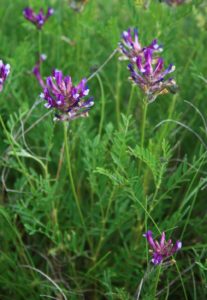Astragalus is a large genus of about 3,000 species of herbs and small shrubs, belonging to the legume family Fabaceae and the subfamily Faboideae. It is the largest genus of plants in terms of described species. The genus is native to temperate regions of the Northern Hemisphere. Common names include milkvetch (most species), locoweed (in North America, some species) and goat’s-thorn (A. gummifer, A. tragacanthus). Some pale-flowered vetches are similar in appearance, but vetches are more vine-like
Contents
Uses
The natural gum tragacanth is made from several species of Astragalus occurring in the Middle East, including A. adscendens,A. gummifer, A. brachycalyx, and A. tragacanthus. Also Astragalus propinquus (syn. A. membranaceus) has a history of use as a herbal medicine used in systems of traditional Chinese medicine and Persian medicine. In traditional Chinese medicine A. membranaceus has been used to reinforce qi and strengthen the superficial resistance, and promote the discharge of pus and the growth of new tissue
Benefits
Astragalus seems to work its magic through the following mechanisms:
- It causes your body to produce more telomeres, a part of your DNA that protects chromosomes from degradation
- It contains a unique class of polysaccharides which are very biologically active
- It improves the rate of replication of immune cells called macrophages
Cautions
Astragalus may interact with medications that suppress the immune system, such as cyclophosphamide. It may also affect blood sugar levels and blood pressure.Some Astragalus species can be toxic. For example, several species native to North America contain the alkaloid swainsonine, which may cause “locoism” in livestock. The toxicity of Astragalus taxa varies.
Interactions
- Cyclophosphamide (Cytoxan, Neosar) interacts with ASTRAGALUS
Cyclophosphamide (Cytoxan, Neosar) is used to decrease the immune system. Astragalus increases the immune system. Taking astragalus along with cyclophosphamide (Cytoxan, Neosar) might decrease the effectiveness of cyclophosphamide (Cytoxan, Neosar). - Lithium interacts with ASTRAGALUS
Astragalus might have an effect like a water pill or “diuretic.” Taking astragalus might decrease how well the body gets rid of lithium. This could increase how much lithium is in the body and result in serious side effects. Talk with your healthcare provider before using this product if you are taking lithium. Your lithium dose might need to be changed. - Medications that decrease the immune system (Immunosuppressants) interacts with ASTRAGALUS
Astragalus increases the immune system. Taking astragalus along with medications that decrease the immune system might decrease the effectiveness of medications that decrease the immune system.Some medications that decrease the immune system include azathioprine (Imuran), basiliximab (Simulect), cyclosporine (Neoral, Sandimmune), daclizumab (Zenapax), muromonab-CD3 (OKT3, Orthoclone OKT3), mycophenolate (CellCept), tacrolimus (FK506, Prograf), sirolimus (Rapamune), prednisone (Deltasone, Orasone), corticosteroids (glucocorticoids), and others.
Other names
Astragale, Astragale à Feuilles de Réglisse, Astragale Queue-de-Renard, Astragale Réglissier, Astragali, Astragalo, Astragalus Membranaceus, Astragalus mongholicus, Astragli Membranceus, Beg Kei, Bei Qi, Buck Qi, Chinese Astragalus, Huang Qi, Huang Se, Hwanggi, Membranous Milk Vetch, Milk Vetch, Mongolian Milk, Ogi, Phaca membranacea, Radix Astragali, Radix Astragalus, Réglisse Bâtarde, Réglisse Sauvage
References
Source: Wikipedia, https://en.wikipedia.org/wiki/Astragalus#Traditional_uses
Healthkismet, http://blog.healthkismet.com/astragalus-health-benefits

